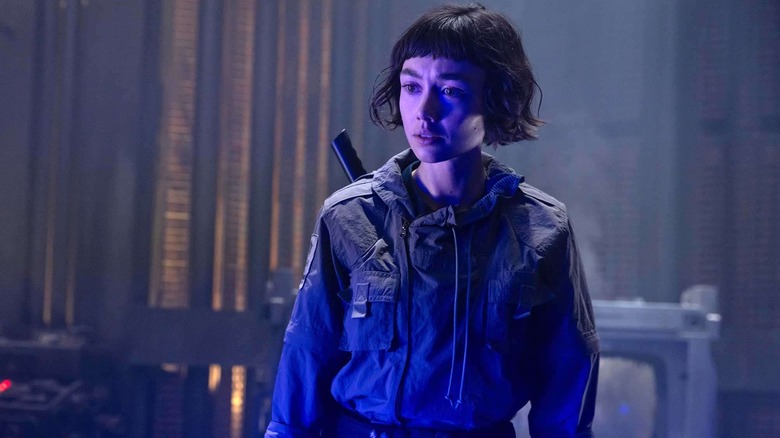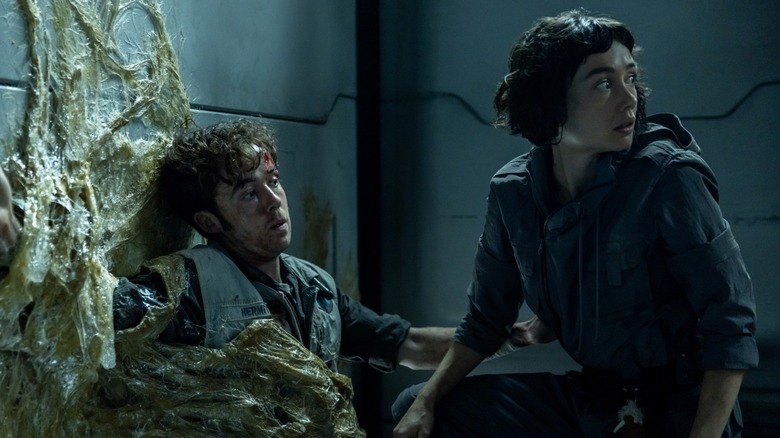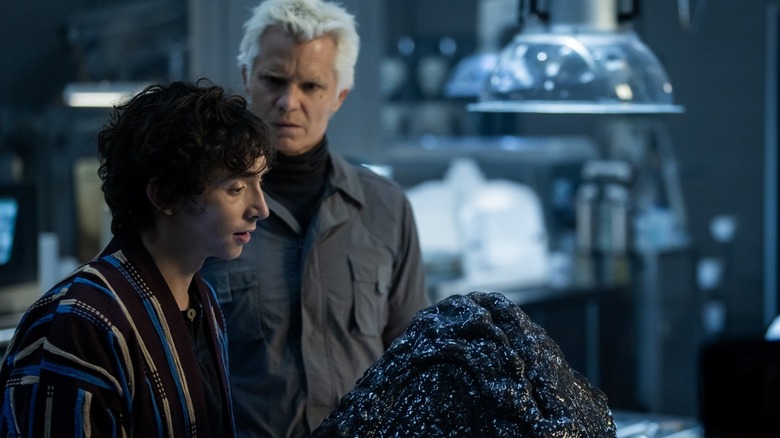Alien: Earth Proves Noah Hawley Is The Perfect Guy To Fix Another Beloved Franchise
Spoilers ahead for the latest episode of "Alien: Earth."
Between advances in visual effects and increasing TV show budgets (itself a bit of a double-edged sword), it's gotten to the point where TV spin-offs of major movie franchises can look just as good as their big screen counterparts. A show like "Andor" has practical sets that look as vast and detailed as those in any "Star Wars" film made in the past 25 years, while "The Rings of Power" has delivered large-scale battles on par with those in Peter Jackson's "Lord of the Rings" trilogy.
Enter "Alien: Earth," a series with impressive production design, but also one that has torn the /Film newsroom apart. Indeed, depending on who you ask on our staff, they'll either agree with our own Chris Evangelista (who, in his review, called the show "a lifeless slog that's a chore to sit through") or extoll the virtues of Noah Hawley's new take on the 46-year-old "Alien" franchise.
After seven "Alien" movies and a pair of "Alien vs. Predator" crossover films, "Alien: Earth" has finally brought the Xenomorph to our front door via long-form storytelling. The series takes place in 2120, two years before the events of Ridley Scott's original 1979 "Alien" film, and takes place in a world dominated by mega-corporations competing to achieve immortality through synthetic technology. Of course, when a deep-space vessel carrying alien beings crash-lands on Earth, it unleashes absolute hell.
Though some of the lore additions in "Alien: Earth" overcomplicate the franchise, while the show's focus on children whose minds have been trapped in synthetic grown-up bodies may alienate the fans hoping for a more adult-focused story, there are two things Hawley and his creative team have managed to capture from Scott's sci-fi classic. For one, the series looks stunning, with production design that's like something straight out of H.R. Giger's weirdest dreams. The second thing is that "Alien: Earth" retains that film's horror atmosphere and disdain for corporations, which is what makes Hawley a worthy addition to the list of filmmakers to work on the "Alien" property.
It's also exactly why he should take on the "Jurassic Park/World" franchise next.
Noah Hawley can make dinosaurs scary once more
The first three episodes of "Alien: Earth" deliver a marvelous horror arc on their own. It all starts with what's essentially a remake of the opening of Scott's "Alien," with the crew of a spaceship – in this case, the USCSS Maginot – waking up from cryo-sleep and engaging in playful banter over breakfast before things quickly erupt into chaos when the alien creatures they are transporting get loose. Just the shots of the ship's security officer, Morrow (Babou Ceesay), contacting Weyland-Yutani while a Xenomorph tries to break down the door separating him from instant death are thrilling on their own.
After that, the second episode is a descent straight into hell, with the USCSS Maginot crash-landing in New Siam (modern-day Thailand), an area controlled by the Prodigy corporation. The entire episode is delightfully tense, with the different aliens annihilating anyone who comes into contact with them. Hawley and director Dana Gonzales find new and creative ways to use the Xenomorph to create horrific and gnarly scenarios here, like the apex predator crashing a lavish dinner party and literally eating the rich (or a scene where a Xenomorph pretends to be a statue just to mess with its prey).
It's not just the Xenomorph, though; we also get an absolutely terrifying scene where an alien comes out of a dead cat's eyeball.
With "Alien: Earth," Hawley has already proven he knows how to build and maintain tension, create exhilarating set pieces, and use creatures to terrifying effect for more than a two-hour runtime. Just the first three episodes (with the Maginot crashing on Earth, the aliens escaping, and Prodigy capturing them) make for a more cohesive story than any of the "Jurassic World" movies to date — and without betraying the franchise's stance on mercenaries, either. Hawley, in other words, could be the filmmaker to finally save the "Jurassic" franchise via a live-action TV show that actually captures the horror of the original "Jurassic Park" novel and film — one understands that the property's dinosaurs are not cute pets.
A Jurassic World TV show can expand on big tech
One of the problems with the "Jurassic World" movies is that each of them so far has spent too much time adding things to the franchise's lore for no reason other than to justifying making yet another one of these films, all before getting to the dinosaur horror and action. By that point, though, it's usually too little, too late, which is something Hawley could easily remedy.
Then we have the idea of transferring a human child's consciousness into a synthetic body on "Alien: Earth." Granted, folks are divided on this element, but it allows the series to explore issues of corporate warfare and rampant capitalism, with the idea of corporations literally owning the planet making for a brilliant extension of the original "Alien" movie's mythos. What's more, it shows Hawley could excel at tackling similar themes from Michael Crichton's original "Jurassic Park" book. After all, the "Alien" franchise has always been anti-corporations, with each film exploring that idea differently. "Alien: Earth" simply expands upon that theme by introducing a world where a company can own a country. Can you imagine what Hawley would do with the genetic technology industrial complex?
The point being, a "Jurassic" TV show run by Hawley could do for the franchise in live-action what the series "Jurassic World: Camp Cretaceous" did in animation — namely, dive deep into the conflict between the franchise's own nefarious corporations (InGen, Mantah Corp, and Biosyn) and take advantage of its medium to do that story justice.
"Alien: Earth" is now streaming on FX on Hulu, with new episodes dropping on Tuesdays.


